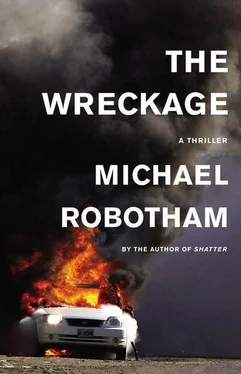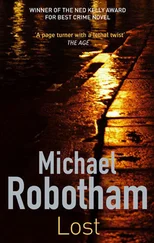Michael Robotham - The Wreckage
Здесь есть возможность читать онлайн «Michael Robotham - The Wreckage» весь текст электронной книги совершенно бесплатно (целиком полную версию без сокращений). В некоторых случаях можно слушать аудио, скачать через торрент в формате fb2 и присутствует краткое содержание. Жанр: Триллер, на английском языке. Описание произведения, (предисловие) а так же отзывы посетителей доступны на портале библиотеки ЛибКат.
- Название:The Wreckage
- Автор:
- Жанр:
- Год:неизвестен
- ISBN:нет данных
- Рейтинг книги:3 / 5. Голосов: 1
-
Избранное:Добавить в избранное
- Отзывы:
-
Ваша оценка:
- 60
- 1
- 2
- 3
- 4
- 5
The Wreckage: краткое содержание, описание и аннотация
Предлагаем к чтению аннотацию, описание, краткое содержание или предисловие (зависит от того, что написал сам автор книги «The Wreckage»). Если вы не нашли необходимую информацию о книге — напишите в комментариях, мы постараемся отыскать её.
The Wreckage — читать онлайн бесплатно полную книгу (весь текст) целиком
Ниже представлен текст книги, разбитый по страницам. Система сохранения места последней прочитанной страницы, позволяет с удобством читать онлайн бесплатно книгу «The Wreckage», без необходимости каждый раз заново искать на чём Вы остановились. Поставьте закладку, и сможете в любой момент перейти на страницу, на которой закончили чтение.
Интервал:
Закладка:
Hackett had spent the morning searching for Richard North-tracking the transmitter he planted behind the bumper of the banker’s car. He was lucky the battery had lasted this long. He had traced North’s car to an industrial estate in Bury Park, Luton, full of factories, marshalling yards, warehouses, workshops, and surrounded by run-down housing estates, second-hand clothes shops and Asian clothing emporiums.
The BMW was parked in the forecourt of a derelict motel. Most of the rooms were padlocked but one or two were being used for storage. Charity collections. Donated clothes and blankets.
Hackett waited five hours for North to show up. Figured he was with a girl. Maybe hookers were using the rooms. Just when he was contemplating a wasted morning, a Pakistani youth dressed in baggy jeans and a hooded sweatshirt emerged from one of the rooms. He walked to the BMW. Unlocked the doors. Checked the glove box, opened the boot, lay down a plastic sheet and then went back inside.
That’s when Janice had phoned to say he had a visitor in the office-someone who gave her the creeps.
The mystery man has gone now. Hackett’s bladder has been clenched for too long. He needs a leak. The toilet is along the corridor. Unzipping his trousers, he rocks on his heels and relaxes, closing his eyes.
The door opens behind him. Hackett looks over his shoulder. The bathroom is small and the man is standing by the sink, arms by his sides. He’s wearing a leather jacket. Dark jeans.
“Are you Colin Hackett?”
“Who’s asking?”
“People call me the Courier.”
“Is that because you deliver messages?”
“I also collect things from people.”
The detective estimates the threat posed. Height. Weight. Speed.
“You finished?” asks the Courier.
“Unless you’re here to help me shake this thing, you can wait outside.”
“I’m good here.”
Hackett is trying to think. What’s he not seeing or remembering? The banker can’t have sent this guy.
“What can I do for you?”
“I want to talk to you about some photographs you took.”
Hackett glances at his shoes. A drop of urine has settled on the polished leather. He pumps soap on to his hands, turns on the tap, washes them carefully and then triggers the dryer, rubbing his hands beneath the warm stream of air.
“They don’t provide paper towels anymore,” he says. “Got to save the trees. Instead we burn fossil fuels to run these things.”
The Courier doesn’t add anything to the observation. He’s not a talker. Hackett considers his options. His mobile is in his coat pocket. His Smith amp; Wesson Airweight. 38 is locked in the office safe.
The dryer falls silent.
Hackett tugs at his cuffs. Straightens his tie. Smoothes down his hair. He’s waiting for someone else to come into the gents.
“You followed a banker,” says the Courier.
“Did he send you?”
“You took photographs. Who has copies of them?”
“You took the memory card from my camera. There are no more copies.”
“The banker had a notebook.”
“I never met the man. I just followed him.”
“What about the girl he was with?”
“I don’t know who she is. How about we go back to my office? We can talk about it.”
Hackett moves towards the door. If he can reach the hallway, he can turn right and run towards the stairs. The Courier is behind him. Stepping closer, something in his hand, a gun maybe, pressed hard between his shoulder blades.
Hackett pivots, aiming an elbow at his face. The Courier ducks it easily and delivers a short sharp jab to the kidneys. Hackett’s knees buckle. Pain breaks over his face. The next punch sends him to the floor, half in the room and half out. The Courier grabs the door and slams it closed across the detective’s head. He slams it again.
A forearm closes around Hackett’s throat, hinged with the opposite elbow, adding to the pressure, sealing off his windpipe. Hackett’s fingers claw at the arm. Kicking. Jerking. He can see a pinpoint of brightness in front of him and feels his mind drifting to a distant battlefield, a rocky island in the Atlantic, where pissing rain has turned to sleet and artillery shells are shaking the ground with a deafening roar.
Squashed flat against the frozen earth, he crawls forward and swings himself into an Argentine trench. Then he sees a soldier wearing a grey poncho, a teenager, sitting in the mud, mouth open in a scream.
The soldier has taken a direct hit from a phosphorous grenade. His head rocks back and forth. Blood pumps from his stomach. Still he screams, the same word, over and over. “ Madre! Madre! Madre! ”
The Company Commander yells, “Will you shut that fucker up!” He’s talking to Hackett, who tries to make the boy be quiet, holding a finger to his lips. Covering his mouth. Making shushing sounds. Still the kid screams for his mother until Hackett puts a hand over his mouth and nose, squeezing them shut, telling him to be quiet, holding him until he falls silent.
The kid’s eyes are open. Watching. Welcoming the darkness.
11
Elizabeth is late picking up Rowan from nursery. The center manager has heard all the excuses before. Polina is never late. Polina doesn’t leave Rowan’s raincoat behind, or forget to pack his painting smock, or leave his fruit salad in the fridge. Polina has wet wipes to clean his face after an ice cream. Elizabeth has to spit on a tissue.
Strapping Rowan into his car seat, she heads north to Hampstead to see her father. The gates are open and she parks opposite a garage that holds matching silver Mercedes side by side.
She follows the crushed marble path around the side of the house. The lawns are mown into green strips and the garden beds turned and composted. Rowan runs ahead to the rear terrace. Shielding her eyes from the sun, Elizabeth spies her father kneeling on the turf, turning the soil with a hand fork.
Alistair Bach looks up. As brown as a medicine bottle, with a tangle of grey hair poking out from an old hat, he dresses like a younger version of David Attenborough in chinos and a heavy cotton shirt rolled up to below his elbows. Soft spoken. Gentle. Conservative. Someone from another age. This is his life now-gardening. Planting. Watering. Trimming the topiary into geometric patterns that seem to float above the flowerbeds.
Bach takes a moment to rise from his knees. Rowan runs to him and is hoisted aloft, spun around until his legs are horizontal with the ground.
“Careful, he’s just had an ice cream.”
“The lucky sod!” He kisses Rowan’s cheek. “Let me guess. Chocolate?”
“Is you a magician, Granddad?”
“How do you think I made this garden grow?”
Elizabeth wants to smile but can’t make her face move. Hugging her father, she clutches him a little too tightly. Bach untangles himself.
“You haven’t heard from him?”
“No.”
She averts her eyes, determined not to cry. “The garden is looking good.”
Bach knows that she’s changing the subject. “My trailing violas are being eaten. Your stepmother won’t let me use insecticide. Everything has to be organic. You should see what she makes me eat.”
“You’ll live longer.”
“It feels like it.”
He’s doing this for Elizabeth’s benefit; pretending to be henpecked and harried. It’s a little boy’s plea for reassurance. She won’t give him the satisfaction.
Alistair Bach acts like an everyman but belongs to the truly wealthy. He has a beach house in Florida, a chalet in St. Moritz and a hunting lodge near Aberdeen as well as the house in Hampstead. It’s a far cry from his childhood when he grew up in a two-up-two-down in Liverpool, the son of a boilermaker and a seamstress, one of eight children, Catholics. He joined Mersey Fidelity straight out of school and in spite of having no banking qualifications rose to become chairman. One of his first decisions was to move the bank’s headquarters from Merseyside to the City of London. Since then he’s only been back to Liverpool a handful of times. Some working-class people are proud of their humble roots. Bach is proud of the climb.
Читать дальшеИнтервал:
Закладка:
Похожие книги на «The Wreckage»
Представляем Вашему вниманию похожие книги на «The Wreckage» списком для выбора. Мы отобрали схожую по названию и смыслу литературу в надежде предоставить читателям больше вариантов отыскать новые, интересные, ещё непрочитанные произведения.
Обсуждение, отзывы о книге «The Wreckage» и просто собственные мнения читателей. Оставьте ваши комментарии, напишите, что Вы думаете о произведении, его смысле или главных героях. Укажите что конкретно понравилось, а что нет, и почему Вы так считаете.












